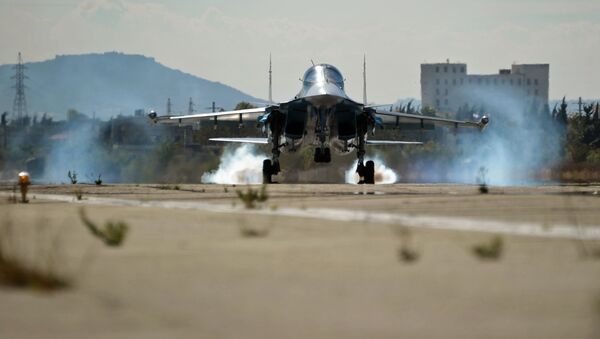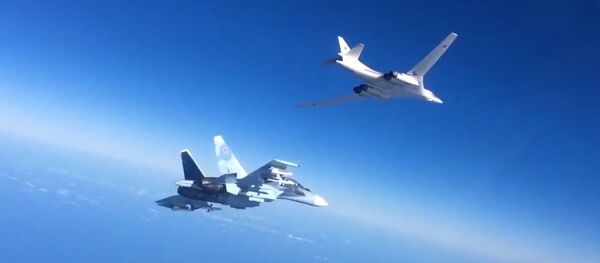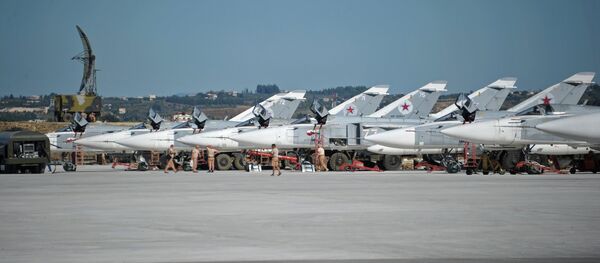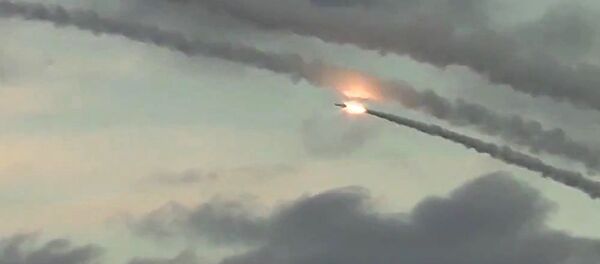According to geopolitical analyst Blake Franko, Moscow's decision to intervene in the Syrian conflict has important side benefits.
In his recent analysis for The National Interest, Franko noted that "besides the obvious reasons –supporting an ally who secures regional interests and landing an embarrassing blow to the Obama administration's Middle East policy," the Syrian mission has, indirectly, given Russia's military a much-needed boost in "continuing its march toward professionalization."
The analyst suggests that the Aerospace Defense Forces' precision air strikes, combined with ship and submarine-launched cruise missile attacks from the Caspian and Mediterranean seas, have "showcased the advances made by [Russia's] military" in the course of its modernization.
Furthermore, he notes, "the testing and refining of new weapons systems is enabling air crews, professional soldiers and Special Forces to gain valuable combat experience."
The analyst urges that "the myth that Russia will be leveling cities in Syria needs to be left behind," with the Russian intervention in Syria (quite successfully) "creating the image of a modern, technologically advanced military."
Downplaying the pessimistic suggestions from among much of the Western media that the Syrian campaign could be the beginning of 'a second Afghanistan' for Russia (that is, a military quagmire resulting in thousands of Russian military dead), the analyst counters by pointing out that all the evidence points to the notion that the Syrian intervention "will be rather limited."
"As the situation stands now," Franko notes, "Russian investment in Syria, at least militarily, is rather scant. The goal of the Russian Federation is not to take large parts of Syria itself, but to provide support, predominantly through airstrikes, to Assad [and the Syrian] military."
"There appears to be approximately one battalion of Russian ground units, which could take part in limited offensive roles, but now seems mainly devoted to protecting Russian air assets. There is talk of injecting Russian 'volunteers' into the conflict, who have already gained battlefield experience in Ukraine. These troops would most likely be used to augment Syrian army units and are minimally problematic for Russia, as they are not part of the army –at least not officially."
"Indeed," the analyst writes, "as the intervention in Syria will likely fan the flames of Sunni radicalism within Russia, it would be advantageous to try to nip the problem in the bud before it spills back into the heartland. Additionally, gaining more combat experience against radical Islamic forces would prove useful for any flare-ups of violence in the restive Caucasus republics."
Of course, Russian security forces have already had over a decade-and-a-half worth of counter-terrorism and anti-jihadist combat experience in the Caucasus, and so it's doubtful that the country's Special Forces really need to take the risks of additional combat training from Syria.
In any case, Franko notes that "though Russia's material involvement in Syria is minimal, Syria provides an opportune proving ground for training Russian armed forces and coordinating actual battlefield operations."
"Drills," he notes, "are just drills: they show that Russia is able to muster significant amounts of troops quickly, but do not reveal how effective these forces might actually be in combat. Fighting in Syria now enables Russian pilots to conduct actual sorties against targets, gaining real-world experience while also supporting a strategic ally in the region. Additionally, the Russian military is now able to test its missiles' combat effectiveness, as was seen in the recent strikes originating from the Caspian Sea."
"These tests of new technology, and coordination between different branches of its Armed Forces," Franko emphasizes, "allow Russia to practice flexing its military muscle in the real world, and not be limited to snap drills."
Ultimately, Franko suggests that even if the most pessimistic appraisals of the end result of the mission in Syria turn out to be true, "Russia is seeing results in the professionalization of its armed forces by fighting in Syria." Moscow, he notes, has "used its previous military conflicts to win valuable lessons, and will probably do the same now."






